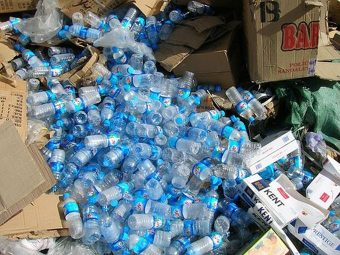
A committee of MPs today accused the government of “dragging its feet” on tackling the UK’s mountain of plastic waste, again urging ministers to introduce a deposit return scheme for bottles and ensure the producers of packaging materials take greater responsibility for recycling costs.
The Environmental Audit Committee (EAC) late last year issued a raft of policy recommendations aimed at reducing the estimated 7.7 billion plastic water bottles “unnecessarily” used by Britons each year, and also on boosting stalling recycling rates across the UK.
Today the EAC published the government’s response to the report, in which it stressed progress had been made in increasing the amount of plastic bottles collected for recycling from less than 13,000 in 2000 to more than 343,000 in 2016. However, Ministers conceded “urgent action” on plastic waste remained vital “for the future of our planet, as well as being a considerable economic opportunity”.
Setting out its response to the EAC, the government said it agreed on the need to enhance the provision of free places to refill water bottles, such as public water fountains and in shops, adding that it was also working on a plan to reduce the use of single use plastics across Parliamentary buildings. The report comes just days after Environment Secretary Michael Gove also revealed the government was investigating the merits and feasibility of a full ban on plastic straws.
However, the government’s response made no firm commitments to shift more of the burden for recycling onto the private sector, nor on the mooted introduction of a deposit return scheme (DRS) to incentivise consumers to return plastic bottles for recycling.
It also declined to commit to setting strict recycling targets beyond 2020, although the government said it would set out in more detail its plans and policies for cutting plastic waste – including on the proposed DRS, new tax incentives, and recycling targets – in Defra’s promised waste and resources strategy which is later this year.
Currently, taxpayers cover around 90 per cent of the costs of packaging waste disposal, and the government said it was “exploring changes” to the packaging producer responsibility scheme that will look at mechanisms to incentivise better design, encourage the use of recycled material, and provide greater transparency for producer funding.
And, while the government is exploring a possible DRS having issued a call for evidence last year, it said it first needed to consider how such a policy would fit with other planned work such as reform of producer responsibility or new taxes on single use plastics in order “to avoid producers or consumers being charged multiple times for the same products”.
It also declined to commit to a post-2020 recycling target, instead stating that the forthcoming waste strategy would look at “alternative targets that prioritise environmental benefits of recycling materials rather than just weight measures”.
Brexit could give the UK the freedom to abandon EU recycling targets post-2020 or set its own targets following criticism from some within the industry of the methodology for measuign recycling rates used by the EU.
However, EAC chair Mary Creagh slammed the government’s response for failing to commit to any concrete policies on producer responsibility, DSR or future packaging targets.
“The government is dragging its feet on introducing a deposit return scheme,” said Creagh in a statement. “Every day the government delays, another 700,000 plastic bottles end up in our streets. This delay is unacceptable, the government must get its ducks in a row.”
She added: “Producers should be responsible for the packaging they produce, but shortfalls in the producer responsibility system have allowed producers to use complex, difficult to recycle plastics. The government’s resources and waste strategy should adopt our recommendations to kick start more sustainable production of plastics.”
Public pressure means bolder action on plastic waste is now all but inevitable. But with few firm policy commitments on plastic waste at present, it seems the green economy will likely have to wait for the long-awaited waste strategy later this year for a clearer sense of precisely how the government intends to deliver its much-trumpeted carck down on plastic waste.
Source: businessgreen.com


